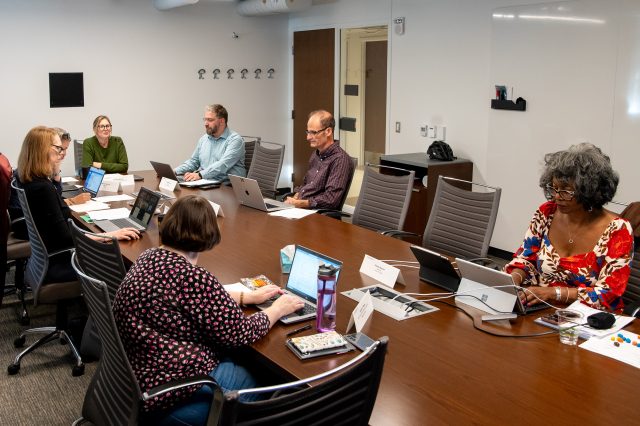[ad_1]
The Senate Advisory Committee on University Affairs met in the Alexander G. Ruthven Building Monday afternoon to discuss the upcoming Police Department Oversight Committee elections and the revision of a Senate Assembly Resolution regarding changes in the Statement of Student Rights and Responsibilities, which outlines U-M policies on non-academic misconduct.
The resolution revision calls for University administration to pause the implementation of the revised SSRR, which has recently faced criticism for being implemented without sufficient input from U-M community members such as the Senate Assembly’s Student Relations Advisory Committee. Changes to the SSRR allow the University to act as a complainant against students. Previously, complaints could only be filed by individual students, faculty and staff members.
SACUA Chair Rebekah Modrak, Art & Design professor, began the meeting by giving a brief chair update, including information about the treatment of a University of Michigan student following a pro-Palestine protest on the U-M campus on Oct. 7. Another student at the protest was arrested and others were pepper sprayed by Division of Public Safety & Security officers.
Modrak explained that a pro-Palestine U-M student who participated in the Oct. 7 protest was prohibited by DPSS Chief Crystal James from going to class, although there were no formal charges brought against him. Modrak said University Human Resources removed the student from their research assistant position on campus without any communication with supervising faculty. The Michigan Daily cannot independently confirm these actions.
“HR did not notify the faculty about the employment change, and we’re hearing about the significant negative impact on faculty research and excessive demands on faculty time as faculty are scrambling to provide education to students,” Modrak said.
In an email to The Michigan Daily, Melissa Overton, deputy chief of police for DPSS, said a DPSS investigation on the matter is ongoing.
“This case is currently open, therefore nothing additional can be released at this time,” Overton wrote.
The multiple offices that deal with disciplinary actions sometimes overlap or conflict with each other. SACUA plans to meet with University Provost Laurie McCauley to discuss the relationship between HR, Student Life, DPSS, the Provost Office and the Office of General Counsel regarding these suspensions to foster greater communication between these groups.
Following the chair updates, Luke McCarthy, director of the Faculty Senate Office, discussed the election process for voting in the upcoming Police Department Oversight Committee election. The committee aims to make the election process as fair as possible. Currently, 10 candidates are running for a position on the committee.
“I’m going to share this ranked-choice voting (method),” McCarthy said. “Instead of voting for four or five (candidates), you would rank your top five and then tally the first choices and see if they have the majority. And if not, drop the person in the last place and shift (up) everybody’s votes who voted for the candidate as their second preference. Then keep doing that process of basically removing the candidate in last place and shifting their votes over until we get to a point where one candidate has the majority.”
The assembly decided on using the ranked-choice voting method. SACUA member Soumya Rangarajan, clinical assistant professor of internal medicine, discussed her opinion on the ranked-choice voting.
“I know choosing one person is very challenging,” Rangarajan said. “I think the ranked-choice idea seems the most fair, rather than a free-for-all community.”
The discussion moved into the revising of the Senate Assembly resolution that discusses pausing the changes in the Statement of Student Rights and Responsibilities.
McCarthy discussed SACUA’s decision to update the Senate Assembly resolution. McCarthy said the original resolution lacked context for non-senate members and that including more updates related to how the assembly has discussed the resolution will provide more historical context to resolution changes.
“The issue that came to light is thinking, ‘How then do we communicate about (the SSRR) given that many faculty members wider than the Senate Assembly are not necessarily going to be understanding of what led up to this?’” McCarthy said. “And so the thought was, could there be a bunch of ‘whereas provisions’ added before it to help spell out that history?”
McCarthy said the updates will be voted on at the next Senate Assembly meeting, but will still need to be presented to the Faculty Senate.
“Go to the Senate Assembly for a vote, and then if it’s approved, it’s just an update that’s provided to the faculty senate at the Faculty Senate meeting,” McCarthy said. “So, it’s not voted on by the Faculty Senate, but it’s provided, ‘Here’s an important update from the Senate Assembly, this is something that was just passed’ and then talk about it with the Faculty Senate.”
Modrak ended the meeting by discussing next steps for the resolution on the SSRR changes.
“If the Senate Assembly approves it on Oct. 28, then it goes forward, and if they don’t approve it, then we could drop it,” Modrak said. “If it passes the vote, then we bring it forward at the Faculty Senate meeting.”
Daily Staff Reporter Halle Pratt can be reached at hallehap@umich.edu.
Related articles
[ad_2]
Source link











